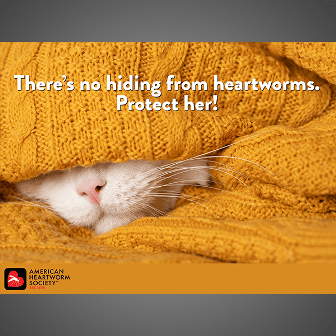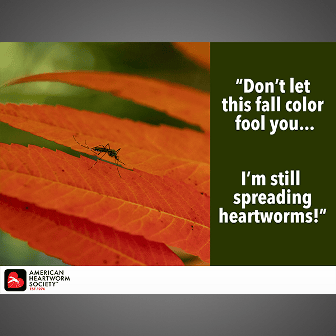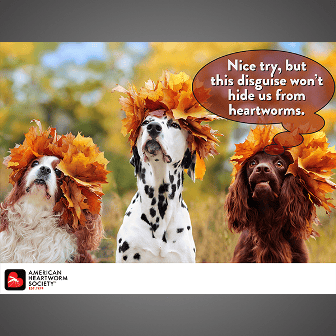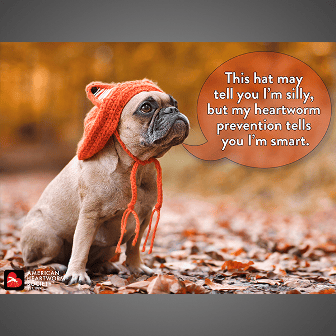“Heartworm disease remains one of the most important—and complex—diseases we address in veterinary medicine, and the information presented at this year’s AHS symposium reflected the complexity of understanding and addressing the disease,” stated Dr. Clarke Atkins, co-chair of the 15th Triennial Heartworm Symposium program committee.
“The AHS mission and guidelines focus on three aspects of heartworm management: prevention, diagnosis and treatment. The information we heard addressed all three,” added incoming AHS president Dr. Christopher Rehm. A record audience of almost 400 veterinarians, researchers and industry representatives from 13 countries and 29 states listened to discussions on the pros and cons of different heartworm treatment protocols, the latest insights on mosquito vectors and blocking strategies, and updates on heartworm resistance and diagnostic techniques. A total of 37 speakers from seven countries presented during the two-and-a-half-day symposium held September 11-13, 2016.
“Those of us with an interest in heartworm disease always come away from these meetings with a number of new things to discuss, whether it’s research we need to fund, educational initiatives needed for the veterinary profession and the public, or potential changes to the AHS guidelines on managing heartworm disease in dogs and cats,” stated Dr. Rehm. “Based on what was presented in this symposium, I anticipate that we will be discussing all of the above at our upcoming board meetings.”
Changes to the AHS board
During the triennial business meeting held during the symposium, 2013-2016 AHS president Dr. Stephen Jones of Moncks Corner, South Carolina, turned over leadership of the AHS board to new president Dr. Christopher Rehm of Mobile, Alabama. Board members Dr. Robert Stannard of Livermore, California, Dr. Wallace Graham of Corpus Christi, Texas, Dr. Martha Smith-Blackmore of Boston, Massachusetts, and Dr. Matthew Miller of Phoenix, Arizona, retired from the board and were replaced by Dr. Christopher Duke of Ocean Springs, Mississippi, Dr. Jennifer Rizzo of Corpus Christi, Texas, Dr. Brian DiGangi of the University of Florida in Gainesville, Florida, and Dr. Andrew Moorhead of the University of Georgia in Athens, Georgia. Dr. Stannard, who served as AHS secretary/treasurer, turned over his responsibilities to board member Dr. Bianca Zaffarano of Iowa State University in Ames, Iowa. Dr. Stephen Jones will remain on the board as immediate past-president, while Dr. Patricia Payne will serve as editor of the AHS Bulleting, replacing Dr. Doug Carrithers, who will remain on the board as an ex-officio member.
About the American Heartworm Society
The mission of the American Heartworm Society is to lead the veterinary profession and the public in the understanding of heartworm disease. Founded during the Heartworm Symposium of 1974. The American Heartworm Society aims to further scientific progress in the study of heartworm disease, inform the membership of new developments and encourage and help promote effective procedures for the diagnosis, treatment and prevention of heartworm disease.
Heartworm Symposium Presentation Summaries
Following is a brief overview of topics along with some of the key speakers from the AHS symposium:
Adulticidal Therapy
Speakers on this topic included Drs. Marisa Ames, Dwight Bowman, Amanda Coleman, Michael Dzimianski, Claudio Genchi, Changbaig Hyun, Laura Kramer, Mark Papich and Molly Savadelis. Studies on non-arsenical heartworm treatment protocols, a comparison of minocycline vs. doxycycline in heartworm treatment protocols and an examination of the susceptibility gap in treatment of canine heartworm infections were covered.
Heartworm Diagnosis
Speakers included Drs. Rick Alleman, James Carmichael, Brian DiGangi, Ray Dillon, Laura Kramer, Norma LaBarthe, Lindsay Starkey and Luigi Venco. Topics included the pros and cons of heat treatment of serum samples and a comparison of commercial antigen tests.
Heartworm Pathology
Speakers on this topic included Drs. Ray Dillon, Changbaig Hyun and Elena Carretón. Topics included the cardiopulmonary effects of heartworm byproducts in the circulation of dogs, cats and rats, and the evaluation of inflammatory biomarkers in dogs with heartworm disease before and after adulticidal treatment.
Lack of Efficacy (LOE) and Resistance
Speakers on this topic included Drs. Clarke Atkins, Catherine Bourguinat, Dwight Bowman, Timothy Geary, Ray Kaplan, Tom McTier, Andrew Moorhead, Roger Pritchard and Adrian Wolstenholme, with presentations focused on trends in lack of efficacy (LOE) reports; genetic profiles of potentially resistant isolates, and practitioner identification of potentially resistant isolates.
Vector Epidemiology, Climate Influences and Mosquito-blocking Therapy
Speakers on this topic included Drs. John McCall, Tanya McKay, Tom Nelson, Audrey Odum and Michael Povelones. This session covered entomology, parasitology, human malarial research, microclimate data and the role of mosquito blocking in heartworm prevention.







